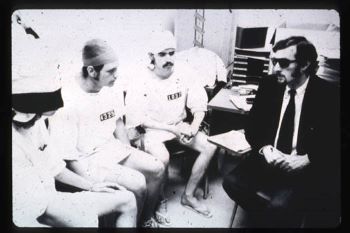Summary | Excerpt | Reading Guide | Reviews | Beyond the book | Read-Alikes | Genres & Themes | Author Bio

The Undercover Mission That Changed Our Understanding of Madness
by Susannah CahalanFrom "one of America's most courageous young journalists" (NPR) and the author of the blockbuster #1 New York Times bestselling memoir Brain on Fire comes a propulsive narrative history investigating the 50-year-old mystery behind a dramatic experiment that changed the course of modern medicine.
For centuries, doctors have struggled to define mental illness--how do you diagnose it, how do you treat it, how do you even know what it is? In search of an answer, in the 1970s a Stanford psychologist named David Rosenhan and seven other people--sane, normal, well-adjusted members of society--went undercover into asylums around America to test the legitimacy of psychiatry's labels. Forced to remain inside until they'd "proven" themselves sane, all eight emerged with alarming diagnoses and even more troubling stories of their treatment. Rosenhan's watershed study broke open the field of psychiatry, closing down institutions and changing mental health diagnosis forever.
But, as Cahalan's explosive new research shows, very little in this saga is exactly as it seems. What really happened behind those closed asylum doors, and what does it mean for our understanding of mental illness today?
Susannah Cahalan's The Great Pretender is a fascinating deep-dive into one of the most influential studies in the history of psychology, Stanford University professor David Rosenhan's 1973 paper "On Being Sane in Insane Places." But while the extent of Rosenhan's influence on the field is clear, it turns out that little else about his story is straightforward. As the book unfolds, it becomes evident that there is yet another layer of meaning to its title—neither Rosenhan nor the details of his study are quite what they appear to be...continued
Full Review
 (964 words)
(964 words)
(Reviewed by Elisabeth Herschbach).
 In The Great Pretender, former New York Post investigative reporter Susannah Cahalan uncovers evidence that Stanford University psychologist David Rosenhan fabricated at least some of the details in his famous 1973 paper "On Being Sane in Insane Places."
In The Great Pretender, former New York Post investigative reporter Susannah Cahalan uncovers evidence that Stanford University psychologist David Rosenhan fabricated at least some of the details in his famous 1973 paper "On Being Sane in Insane Places."
If true, this certainly wouldn't have been the only time a high profile researcher's work has turned out to be flawed or even downright fraudulent. A particularly brazen example is that of repeat offender Diederik Stapel, a former professor of social psychology at Tilburg University in the Netherlands. Stapel rose to prominence in his field with a series of studies that gained media attention around the world. One study purportedly showed that carnivores are more selfish than ...

If you liked The Great Pretender, try these:

The Gallery of Miracles and Madness
by Charlie English
Published 2021
The untold story of Hitler's war on "degenerate" artists and the mentally ill that paved the way for the Holocaust.

by Robert Kolker
Published 2021
The heartrending story of a midcentury American family with twelve children, six of them diagnosed with schizophrenia, that became science's great hope in the quest to understand the disease.